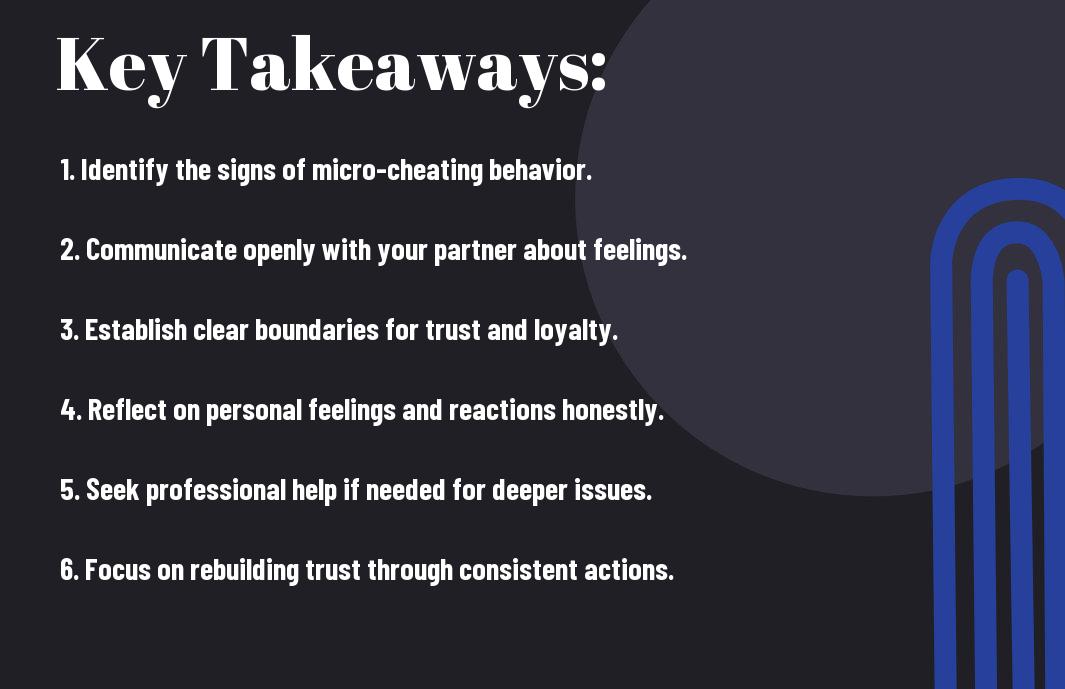Just as relationships flourish through trust, they can suffer from micro-cheating, the subtle yet damaging behaviors that betray your partner’s faith in you. If you’ve found yourself on the receiving end of this emotional hurt, it’s important to recognize that the path to healing is possible. In this post, you’ll discover effective strategies to restore your relationship, rebuild trust, and regain your emotional strength, empowering you to navigate this delicate situation with understanding and resilience.

Key Takeaways:
- Micro-cheating involves subtle behaviors that may undermine the trust in a relationship, such as flirtations or emotional connections with others.
- Communication is crucial for addressing feelings of betrayal; discussing the incident openly can help both partners understand each other’s perspectives.
- Reflect on the reasons behind the micro-cheating behavior; understanding motivations can aid in preventing future occurrences.
- Establishing clear boundaries can foster a sense of security and understanding within the relationship.
- Both partners should engage in self-reflection to evaluate their needs and expectations, improving the overall relationship dynamics.
- Seeking professional help, such as couples therapy, can provide strategies for rebuilding trust and navigating feelings of hurt.
- Focus on rebuilding the emotional connection through positive experiences and activities that strengthen the bond between partners.

Understanding Micro-Cheating
The concept of micro-cheating encompasses subtle actions that may not overtly betray your partner but signal emotional detachment. These behaviors can range from flirty text exchanges to emotional connections with others, often blurring the line between innocent friendships and romantic undertones. Recognizing micro-cheating in your relationship can be a pivotal step in addressing underlying trust issues.
Definition and Examples
Among the various forms of micro-cheating are sending suggestive messages to someone other than your partner, engaging in flirtatious behavior on social media, or keeping secret online interactions. These actions may seem harmless at first, but they can develop into emotional connections that challenge the boundaries of your commitment.
The Impact on Relationships
The effect of micro-cheating on relationships can be significant, leading to feelings of betrayal and insecurity. When you engage in micro-cheating, it is likely to erode the trust you’ve built with your partner, often leaving them feeling undervalued and disrespected. Not only can this cause emotional strain, but it may also create a rift that can escalate into significant conflict. A lack of awareness regarding these behaviors can exacerbate the situation and compromise the emotional intimacy that is vital to healthy relationships.
Recognizing the Signs
Assuming you suspect micro-cheating in your relationship, it’s vital to be aware of both behavioral and communication patterns that may indicate underlying issues. These subtle signs often manifest in unexpected ways, potentially eroding trust and intimacy between partners. By recognizing these signs early on, you can address your concerns and work together to heal any fractures in your bond.
Behavioral Indicators
One common behavioral indicator of micro-cheating is a noticeable change in your partner’s routine, often accompanied by increased secrecy. For instance, they may suddenly start using their phone more frequently, becoming protective of their device, or spending more time away from home without a clear explanation. These shifts can signify a potential emotional shift and warrant deeper investigation.
Communication Patterns
Besides behavioral changes, shifts in communication patterns can serve as alarms for micro-cheating. If your partner suddenly becomes less communicative, avoiding discussions about feelings or future plans, this may indicate that their emotional investment is divested elsewhere. This change can often lead to feelings of isolation and misunderstanding between you.
Consequently, paying attention to these communication patterns can help you identify lurking issues early on. Look for signs such as abrupt changes in tone or decreased engagement during conversations. If your partner seems distant or avoids meaningful discussions, it may indicate that they are emotionally involved with someone else. By fostering open communication and addressing these patterns head-on, you can both begin to navigate the complexities of your relationship and work towards rebuilding trust and connection.
Emotional Responses to Micro-Cheating
For many, discovering micro-cheating can trigger a storm of emotional responses. You may feel confused, angry, or even question your own worth. Acknowledging these feelings is crucial for healing. Engaging with supportive communities, such as the ones found in Recovery from Micro Cheating: r/AsOneAfterInfidelity, can provide valuable insights as you navigate this complex emotional terrain.
Feelings of Betrayal
Above all, feelings of betrayal may wash over you as if a wave has crashed into your relationship. This subtle form of infidelity can feel sharp and deeply personal, leaving scars that take time to heal. Validate your feelings, and recognize that it’s okay to grieve the trust that was compromised.
Navigating Trust Issues
Around navigating trust issues, the path to rebuilding confidence in your relationship can be rocky yet rewarding. You might find yourself questioning everything, including your partner’s loyalty and intentions. Effective communication is key; express your feelings honestly and encourage your partner to share their perspective. Establishing clear boundaries moving forward can enhance your sense of security, allowing you to gradually rebuild trust.
The journey to overcoming trust issues involves consistent effort from both you and your partner. Holding open discussions about what led to micro-cheating can help illuminate underlying problems and foster a deeper connection. Acknowledging that trust is rebuilt over time is crucial; set small, achievable goals that can gradually restore your faith in one another. In doing so, you create an environment where both partners feel valued and understood, paving the way towards healing and renewed intimacy.

Steps to Recovery
Once again, navigating the emotional aftermath of micro-cheating can feel overwhelming. However, taking proactive steps towards recovery will help you rebuild trust and strengthen your relationship. Begin by acknowledging the hurt and confusion, then engage in conversations with your partner to create a clearer path forward, prioritizing your emotional well-being and mutual respect.
Open Communication with Your Partner
Behind every instance of micro-cheating lies a lack of transparent communication. It’s vital to convey your feelings openly—share how the betrayal affected you and listen to your partner’s perspective. By fostering an atmosphere of trust and honesty, you create the foundation needed for healing.
Setting Boundaries and Expectations
At the heart of a committed relationship is the necessity for clear boundaries and expectations. Discuss what’s acceptable and what crosses the line for both of you. This dialogue helps prevent future misunderstandings and redefines the nature of your connection, ensuring both partners feel valued and secure.
A solid set of boundaries enables you to establish a healthier, more fulfilling relationship. By openly discussing and documenting these expectations, you clarify the implications of your unique bond. This proactive approach reinforces mutual respect and helps avoid situations that could lead to further feelings of betrayal. You must be aware that boundaries are not just restrictions; they are vital components that allow you and your partner to thrive together. With effective communication, you can ensure that both of your emotional needs are met, making both of you feel more cherished.
Rebuilding Trust
Many relationships face the challenge of trust after experiencing micro-cheating. To effectively rebuild this foundational aspect of your bond, it’s imperative to engage in open and honest communication. Sharing feelings and discussing boundaries can create a stronger connection, along with consistent actions that reinforce reliability. Trust is earned over time, so patience is key as you work together to mend the fabric of your relationship.
Strategies for Healing
Among the most effective strategies for healing from micro-cheating is establishing clear communication. This includes not only expressing feelings but also actively listening to your partner’s concerns. Engaging in regular check-ins can foster a deeper connection and understanding. Additionally, considering couples therapy can provide a safe space for both partners to navigate complex emotions and rebuild their relationship on a solid foundation.
The Role of Forgiveness
By embracing the concept of forgiveness, you can free yourself from the weight of past betrayals. Forgiveness is not about excusing the behavior but rather about releasing the negative emotions that hinder your healing journey. It’s imperative to recognize that this process can take time and involves both personal reflection and dialogue with your partner.
Hence, understanding the role of forgiveness is vital to your recovery. While it may be difficult to let go, it can lead to a more positive emotional state. To forgive, you must allow yourself to process feelings of hurt and anger first. As you gradually shift towards forgiveness, it creates space for trust to re-establish and your relationship to grow stronger. This shift can transform your connection into a resilient partnership built on mutual understanding and respect.
Moving Forward
All relationships can experience challenges, but recovering from the issue of micro-cheating requires a focus on healing and growth. Moving forward means reevaluating not only what went wrong but also how to strengthen your bond. It’s important to confront the underlying issues, communicate openly, and establish new boundaries that will enhance trust and intimacy in your relationship.
Strengthening Your Relationship
Above all, prioritize open communication with your partner. Discussing feelings, fears, and needs can help you both regain trust. Establishing shared goals and spending quality time together can create a deeper connection. Regularly checking in with each other reinforces your commitment and ensures you are both on the same page. Enriching your relationship will help diminish the doubts cast by micro-cheating.
Personal Growth and Reflection
Any journey of recovery involves self-reflection and personal development. Use this time to assess what you want from your relationship and how you can improve yourself. Acknowledging your feelings and needs will equip you with the insights necessary to forge a stronger connection moving forward.
Understanding your responses to betrayal can lead to profound personal transformation. By reflecting on your emotions and actions, you can identify patterns that may have contributed to the situation. This journey not only allows you to develop greater self-awareness, but it also fosters emotional resilience. Finding and addressing your vulnerabilities offers a pathway to a more fulfilling relationship while enabling you to cultivate a deeper sense of trust and intimacy with your partner. Embrace this opportunity to grow, and allow it to shape a more robust future together.
Summing up
From above, it’s clear that micro-cheating can create emotional turmoil in a relationship. To recover from this subtle betrayal, you need to engage in open communication with your partner, reassess your boundaries, and work on rebuilding trust. Acknowledging your feelings and having honest conversations can lead to greater understanding. It’s important to focus on personal healing while also nurturing the relationship, allowing both you and your partner to emerge stronger. Approaching this experience thoughtfully can pave the way for a more authentic and resilient connection moving forward.
FAQ
Q: What is micro-cheating?
A: Micro-cheating refers to small, often seemingly harmless actions that may indicate disloyalty or emotional infidelity in a relationship. This can include flirting with someone else online, maintaining secretive communication with an ex, or overly intimate interactions on social media. Although these actions might not constitute traditional cheating, they can still lead to feelings of betrayal and mistrust.
Q: How can I identify if I am a victim of micro-cheating?
A: Signs of micro-cheating can include noticing your partner frequently texting someone else without transparency, hiding their phone, becoming secretive about social media use, or receiving messages that seem flirtatious. It’s important to trust your instincts—if something feels off, it’s worth discussing with your partner.
Q: What steps can I take to recover from the emotional impact of micro-cheating?
A: Recovering from micro-cheating involves open communication with your partner. Start by discussing your feelings and concerns about the actions that hurt you. Establish boundaries moving forward to rebuild trust. Engaging in individual or couple’s therapy can also be beneficial to address underlying issues and foster healing.
Q: Is it possible to rebuild trust after experiencing micro-cheating?
A: Yes, rebuilding trust is possible but requires effort from both partners. It involves acknowledging the behavior, understanding its impact, and committing to change. Both partners should openly express their feelings and work together to establish enhanced communication and boundaries. Patience, understanding, and consistent actions are key to restoring trust.
Q: Can a relationship survive micro-cheating, and how?
A: A relationship can survive micro-cheating if both partners are willing to engage in honest discussions, acknowledge the implications of the behavior, and work actively towards rebuilding the connection. This includes establishing new boundaries, focusing on personal growth, and fostering emotional intimacy. Mutual commitment to the relationship’s improvement will determine its future success.
